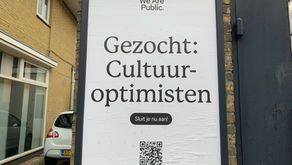Birmingham Contemporary
- Judith Weir
- Oct 5, 2014
- 2 min read
It’s the friendly touches that make Birmingham such an enjoyable destination, and my picture shows a fine example. Where else would they think “all this concrete motorway underpass needs is a few Chinese lanterns and it’ll look really lovely” ? And in its own way, it does.
I thought of this when pondering my eagerness to make the four-hour round trip from my home to hear any performance by BCMG in Birmingham. We hear new music concerts in London (not as often as we should in a world artistic capital) but I rarely approach them with the same zippy enthusiasm that leads me into the CBSO Centre, where everyone in the foyer is so – I have to say it – friendly. That’s not to say that BCMG have dumbed down or gone pseudo-accessible; far from it, usually. But it always feels that their serious repertoire choices are presented in a spirit of lively exploration, which takes over the moment you arrive.
Particularly drawing me to Berkley Street this time was the world premiere of Raga Fields, a concerto for sarod and ensemble by Param Vir. Some arts planners might think it rather obvious to ask a Delhi-born British-based composer for a spot of east-west fusion. But as this fastidious and exceptionally literate artist explained in an informative pre-concert talk, his lifetime had been all too full of hearing bad versions of Indian music by Western composers; so much so that already by the age of 19 (!) he had published an extensive article in the Times of India decrying this phenomenon. Raga Fields was obviously the product of great philosophical reflection – PV (as he’s known to all) described the period of composition as ‘painful’ at times. But his new work seemed to me full of important discoveries – particularly his way of finding a Western (Messiaen-inspired) mode to fit inside an Indian raga, so that the sarod and western instruments could genuinely co-exist tonally.
As so often, on hearing a major new composition, I was struck by how much time had gone in to this conjunction of talents – planning the premiere (which will now have repeats in Chicago and Vienna); considering and writing the piece; and by no means least, learning to play the music. Sarod player Soumik Datta had to master a lot of music written in a notation system he doesn’t usually work in. He did so with great elegance and freshness. I couldn’t wait to hear more sarod music when I next had the chance. In my brain at least, east-west fusion was really happening during this adventurous concert.






